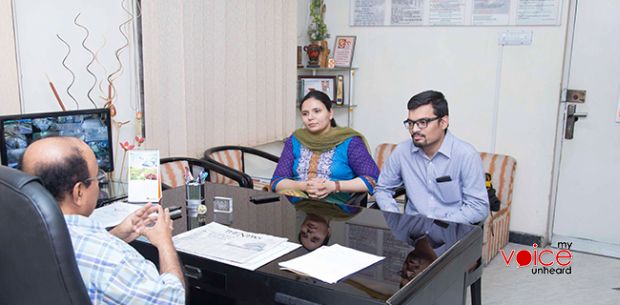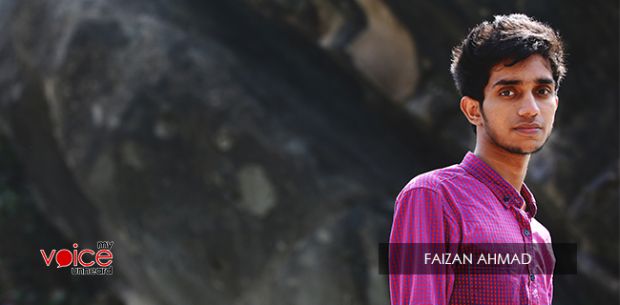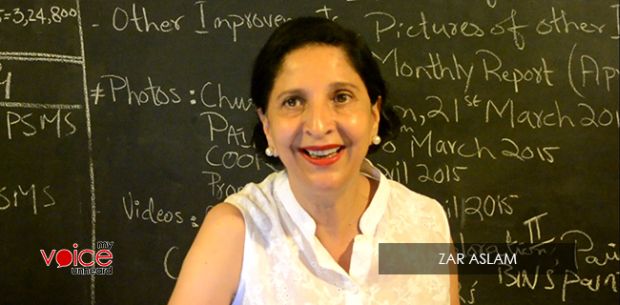My Voice Unheard is a humanistic project that aims at bringing a counter-narrative to the uni-dimensional and clichéd image of Pakistan through self-expression. Anum Nawaz and her team collect biographies and a memoirs of real Pakistani’s who are not terrorists or extremists and have in fact, contributed positively to the world in their own distinct ways. However, these individuals are lesser known for their work and the platform aims at acknowledging, appreciating that and sharing it with others in order to counter stereotyping of Pakistan. My Voice Unheard was started as a social media campaign in 2015 when Anum was selected as the World Peace Caravan Youth Ambassador from Pakistan and started this project as part of the Ambassador Program. Sadly, the program could not continue due to lack of funds, but she and Hammad who is also co-founder and lead curator, continued working on ground and streamlined this initiative to a project with a vision to change perspectives with and around the world. It is now a project for public benefit, incorporating citizen journalism and self-expression at the same time.
At the moment Anum and Hammad have a talented voluntary team of 16 that includes writers, editors, designers, IT professionals, photographers, bloggers and contributors who constantly keep the spirit up high and work dedicatedly towards this cause. Therefor, our newest article is exactly dedicated to My Voice Unheard and its youth leaders, Anum and Hammad.
Mladiinfo: Why you have launched the platform?
Anum: This platform has been launched specifically to break stereotypes and misconceptions about Pakistan and its people. I believe that the local and international media is biased towards showing just the negatives about what happens in this part of the world and I think this is something that every country faces. However, I sternly believe that providing both narratives to the local and global world will help us connect to each other, break the stereotypes that exist and hence, avoid discrimination that may occur due to stereotyping.
Hammad: To add to this, My Voice Unheard is not just about showing the positive picture. It does not claim that whatever happens in Pakistan is good and that there are conspiracies against the country. We do realize that. Pakistan suffers through problems of a developing country such as Sovereignty Violation, Poverty, Energy Crisis, Economic instability, Education crisis, Corruption, Gender inequality and Judicial Desecration. To put up some statistics, over the last 5 years, 527 Sectarian attacks have killed over 2100 people from various religious minorities; 53 Journalists have sacrificed their lives for the freedom of speech; In the last 5 years, 10,082 civilians and 3,453 security force personnel have lost their lives as a result of terrorist violence. (South Asia Terrorism Portal, 2015). More than 150,000 Pakistani Soldiers are fighting terrorism within the country right now and we are practically in a state of war.
It is not just these statistics that made us think of bringing a counter-narrative, but in our research we found that the general perception of this country world-wide is not true. For example, an article published by Forbes on the recent elections, Pakistan was referred to as “the most dangerous Nation”. In a poll conducted for BBC by GlobeScan and PIPA, Pakistan was perceived as a “Mainly Negative” influence on the globe by 55% of the population. This is saddening for us. Pakistan may have problems, but that’s not all about it.
Anum: Moreover, the idea of free speech and self-expression in a collectivistic culture is not considered to be a part of value system and is usually suppressed and discouraged. Thinking of all these factors, we ideated this project to aim at three things: (1) breaking stereotypes, (2) bringing a counter-narrative, (3) providing opportunities to children, youth and adults to express what they want to. Hence, we found that using primary resources of research through in-person interviews, compiling and archiving the life and work of Pakistani’s and recognizing that at a national and international level could help us elevate the three problems that we found in our research. We believe that this is something that we could do through social media to bring a change in perception around the world.
Mladiinfo: Can you explain, how stereotypes become products of culture? What are the circumstances that aggregate “this condition”?
Anum: As a student of Psychology I have learned that judgment and stereotyping is a natural process which may lead to more aggressive behaviors and attitudes such as discrimination and violence. At the same time, if these dispositions are in our consciousness, it could be help come together and be productive rather than leading to hostile behaviors. It becomes a product of culture because when a lot of similar people live together (let’s call this the in-group), it is likely a lot of people who are not from that culture (let’s call this the out-group) tend to make assumptions and think that those assumptions are right, based on very little information. This is when stereotyping becomes a product of a culture towards the people from a different culture. It even aggregates when people from different cultures remain in their silo and are too afraid to take another road of exploration, collaboration and friendship. However I think, with exchanges, connection and networking, where people get to know each other rather than just having assumptions in their mind, we could reduce stereotypical behavior to a lot of extent. This is primarily what My Voice Unheard is trying to do through social media.
Mladiinfo: What’s been your personal drive, or is there some personal story behind that have provoked you to speak up?
Hammad: When I was on the International Visitor Leadership Program in United States, I was asked questions like “do you guys have cinemas in Pakistan?” Or comments like “Yes, we know Pakistan is in Middle East”
In my heart I was surprised to know that people knew so little about Pakistan. Some of the best graphics of highly rated Hollywood movies have been designed my Pakistani’s and I was asked if we had cinema? At this point I thought that I need to do something about it, there must be something that I could do. It was only in 2015 when I found exactly what I thought would make a paradigm shift in the lives of the people about the false perceptions about Pakistan.
Anum: I agree with what Hammad said, even when I visited US in 2013 I had similar experiences. But what really touched me to begin this project in Pakistan was that once in a summer camp that I was overlooking as part of my full-time job, a girl asked me, why I was there. I said I was there to talk. She laughingly said “Are you a talking teacher? Well, there are no talking classes”. This is when I realized that the need to free self-speech and expression is a right of every child and adult. However, in collectivistic cultures, it isn’t much appreciated. So I thought of My Voice Unheard as a platform that could provide people the opportunity to express themselves through writing, photography, videos and illustrations.
What drives me to do this is because I genuinely want to appreciate and acknowledge the work that the people of my Country are doing, unconditionally. This is my inspiration and keeps me going. I am sure, it could be somebody else’s inspiration too.
Mladiinfo: What are your favourite stories which you have featured under the “My Voice Unheard” platform?
Hammad: It is very difficult to decide on one favorite story. A few months back, we asked all members of the team to tell us about one story that really liked. Here is what their preferences were: Maxwell Shanti- The “Pakistani”: The story of a Sri Lankan who left his own Country to serve the people in Pakistan since last 45 years, in the field of Education; Zar Aslam- Putting Women in the driving seat: The story is about a social activist who left her life in US to come to Pakistan and empower women in ways which are tabooed in the society; Faizan Ahmad– The Ethical Hacker: The Story is about a teenage boy who has helped companies find bugs in their websites and has been recognized by MIT, IBM, HP, NASA, AVG, United Airlines, Weestern Union and General Motors among many other organisations; Ghazala Irfan- The Unrelenting Philosopher: An independent woman who has taught Philosophy for almost 40 years, despite it being a liberal subject and has also kept the legacy of classical music alive in Pakistan; Dr Faisal Dar- Pioneer of Liver transplant: The story of a doctor who is the pioneer of liver transplant in Pakistan and has saved many lives since then.
Mladiinfo: Currently you have four distinct series through which you target different audiences, and you collect different stories. Can you share with us something more on the series, and, if you have any future plans of expanding them to tackle further the cliched images of Pakistan?
Anum: When we initiated My Voice Unheard, we targeted individuals who had done exceptionally well in their careers and were pioneers in one way or the other. Gradually we realized that it is not only the stories of those who have enterprises and are unique, but there are tremendous amount of people whose lives we don’t know about. The assumption being that everybody has accomplished something in an honest and truthful way. We wanted to capture these stories as well. If someone is not educated, it does not mean they have lived a worthless life – in fact it could also mean that their lives, however simple, may be bursting with wisdom. Then there are people who have spent their lives making impact all around them, but never got the spotlight, we wanted to acknowledge and appreciate their work as well. Same goes for all the minorities in Pakistan who have left comfortable lives to serve the nation. As we broadened our horizons, we thought it would be better to streamline different stories under different categories to include the diversity that this nation holds.
Currently we have four series: The Unheard (#My Voice heard) – A collection of original biographies of visionaries who have struggled through their initiatives and start-ups to build a progressive Pakistan; Simply Pakistan (#Wisdom paramount) – A collection of original memoirs of a simple Pakistani who has rendered hardships and struggles to live a life of value and virtue; White for the Green (#Surprisingly minute, #astonishingly powerful, #guardians of the green) – An exclusive series of the profiles of Ethnic and Religious minorities who have greatly served the Country; Reclaiming Pakistan (# Reclaiming Pakistan, #Tell the world-) – A collection of original and researched biographies and factual information on individuals who have spent their lives for a cause, Geography, Culture, History, Art and Language.
We believe all stories need to be heard and that each story is important. In the future we are aiming at collecting these to publish a coffee table book, especially outside Pakistan to make people aware of the honesty, hospitality, truth and love that imbibes the Countrymen. We are also looking forward to compile another series of foreigners who visit Pakistan and have changed their perceptions since their visits.
Hammad: Apart from this, we need a greater outreach so that more people know about the lives of us Pakistani’s and break stereotypes. For this we are in the process of launching our first mobile application on App Store and Google PlayStore which could be downloaded for free and you can read hundreds of stories in your phone and anytime anywhere. It’s a small user friendly application and hardly takes 4MB of your mobile space. The best part is that you can share the story with us right away there through the application via video, music or written testimonial. We should actually have this launched for our first anniversary which will be on 11th March 2016.
If you yourself have an interesting story to share, reach out to our team at stories@myvoiceunheard.com
Mladiinfo: Would you do this at global level at some point?
Hammad: We are trying our best to reach the global world to hear the voices of great Pakistani men, women and youngsters. This is a cause for the global world and not just limited to Pakistan. With the passage of time we have also realized that even within Pakistan when we put up our stories, local people start networking with the individuals that we cover, hence taking on a collaborative approach towards progress.
We have also started following up with foreigners who have visited Pakistan and found it an interesting place to be in. Such as just recently we reached Oliver Fisher a student from Australia who was in Pakistan for an exchange internship and absolutely loved the culture here. We also, had an in-person interview with Sophee Southhall a blogger, photographer and traveller from Australia who visited Pakistan just recently and through her photography, showed the world the other side of the beauty that resides in this country.
We would ideally want publications in print, around the world in the form of a book or a magazine, because we want the word out for other people to know the kind of people Pakistani’s are at heart. What’s our culture and heritage like, what does it sound to be like a Pakistani.
Anum: Another long term vision of our cause is to have other countries pilot this model in their respective areas. I will not be surprised to know that people from other cultures are as much stereotyped as Pakistani’s are. If we all come together, beyond borders, we could at least try to remove the misconceptions about our respective countries. And to me, the best way possible is to have real people tell real life experiences to real people out there in the world. At the end of the day we all have to take the leap of faith and trust that people are going to believe in us and that is the ingredient that makes all the difference.
Mladiinfo: What would you share to the global audience and followers of Mladiinfo?
Anum: When I look at the world, I wonder at night, if things had always been the way they are today. Maybe people faced the same challenges differently. However, when I think of what is happening around the world today, my heart aches because of the pain that we all share in multiple avenues. Everywhere I see, people are being killed, children are abused, there is discrimination, violence, war, terrorism, extremism among the many brutalities and I wonder if there is anything we could do to bring a little bit of peace in our minds and hearts. And through this I realize that it always has to be you. YOU have to begin the change you wish to see in the world. And this is not easy. Peace, like smile and happiness is contagious for me. If you are at peace with what you do every single day of your life, you will spread it. It’s high time that we invest in our own selves in order to bring peace to the world. Remember you can’t pour from an empty cup 🙂 So my message for all the people who are reading this is to fill your own cup with happiness and peace and only then you will be able to reciprocate it in the community you live in.
Hammad: I would just like to say that play your part in improving lives of people around you without thinking how big or small your impact is. Sometimes our words or small actions go a long way in changing the lives of people. Learn to listen and understand where other person is coming from and you`ll be amazed at the struggle of people around you. Secondly taking first step is always harder, people`s world and actions will try to bring you down but believe in what you like to do and more importantly enjoy it!
Interview by: Stefan Alijevikj
Edited By: Ivana Petrisková




